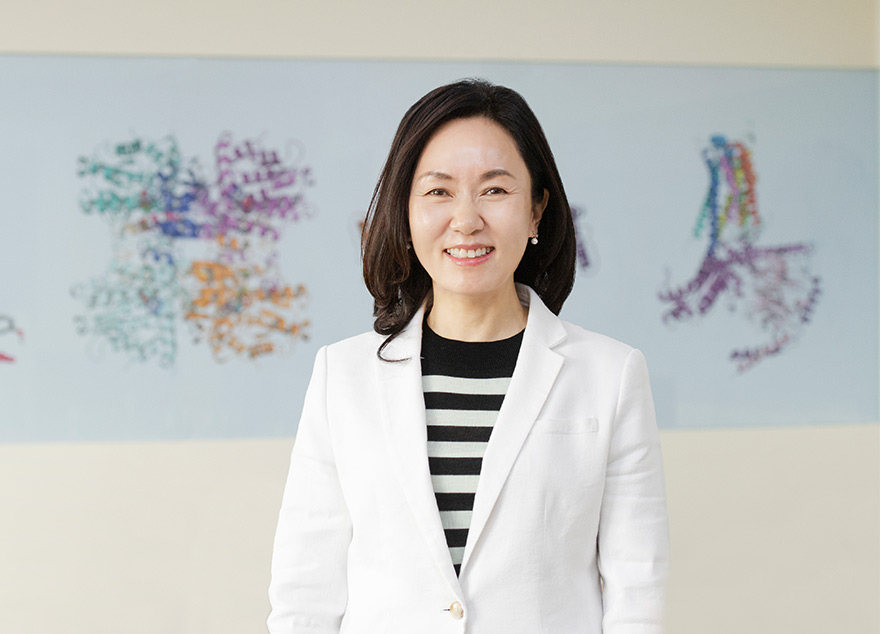
Prof. Sun Choi's team ushers in a new era of drug discovery through interdisciplinary research using supercomputers
Sun Choi (sunchoi@ewha.ac.kr; http://caddsc.ewha.ac.kr/)
Department of Pharmacy, Dir. of Global AI Drug Discovery Center
Developed a new technology to starve liver cancer cells by inhibiting the translocation of arginine that is essential for liver cancer cell survival and elucidated the binding mechanism of arginine and the target protein ‘TM4SF5’.
Published in the world's top academic journal, 'Cell Metabolism', and selected for an excellence.
Sun Choi, a professor at the college of pharmacy at Ewha Womans University, recently published a collaborative work, ‘Transmembrane 4 L Six Family Member 5 Senses Arginine for mTORC1 Signaling’, in ‘Cell Metabolism’(IF 22.415). The research was based on molecular modeling using supercomputers.
According to recent clinical studies, translocation of arginine into cytoplasm is the key for liver cancer cell proliferation and survival. Therefore, clinical attempts to decompose arginine has been started and thus, many researchers have tried to identify the arginine sensor, which gauges the level of arginine inside the lysosome and translocates the arginine into cytoplasm.
The research team focused on inhibiting the arginine translocation into the cytoplasm rather than decomposing arginine, which has limitations such as resistance issue, etc. The research discovered that TM4SF5, a transmembrane protein, moves between cell and lysosome membranes based on the levels of arginine of outer liver cancer cell and inner lysosome, and activates S6K1, an important signaling factor for protein synthesis in lysosome. Thus, TM4SF5 was proposed as a physiological arginine sensor inside the lysosome. In particular, the researchers discovered that the use of TM4SF5 inhibitory compound (TSAHC) can inhibit the binding of TM4SF5 and arginine which further impedes the proliferation of liver cancer cells by interfering with protein synthesis signalings.
"This study is significant as it suggests a target for liver cancer treatment as well as a clue for drug development through a novel technology that detects an amino acid essential for liver cancer cell survival and inhibits the translocation of the amino acid," said the research team.
This research was conducted by Professor Sun Choi, Dr. Minghua Cui, Ph.D student Stephani Joy Y. Macalino at Ewha Womans University and the research team led by Professor Jung Weon Lee at Seoul National University, and was supported by Fibrosis Control Center (MRC), Mid-career research program funded by the Ministry of Science and ICT (MSIT) through the National Research Foundation of Korea (NRF), the Global Frontier project, and the national supercomputing center R&D innovation support program by Korea Institute of Science and Technology Information (KISTI).
Professor Sun Choi has conducted innovative researches, introducing biophysical methods using molecular modeling and multi-scale simulations into the field of medicine, utilizing three-dimensional structures and dynamics of target proteins and multi-scale simulation, and developing inhibitors based on reaction mechanism studies. She has published more than 100 papers in SCI indexed journals and applied for numerous domestic and foreign patents as well as transferred technologies to the drug development industry. She works on follow-up researches using big-data and artificial intelligence (AI) as the head of the 'Global AI Drug Discovery Center,' which was recently established at Ewha Womans University.
With these academic achievements, Professor Sun Choi has received the Presidential Citation on the 52nd Science Day (2019), the Nok-am Academic Award (2019), the Peking University Pharmaron Lectureship Award (2018), and the Cheon Moon Woo Medical Chemistry Academic Award (2019, 2020). Also, She was also selected as a PengCheng Scholar (2019) in Shenzhen, China, and the best professor of research achievements at Ewha Womans University (2020). She served as the president of the Korean Society for Protein Science (2018-2019), the president of the division of medicinal chemistry from the Pharmaceutical Society of Korea (2020-), the vice president of the Korean Society for Bioinformatics (2017-), the vice president of the Korean Society of Molecular and Cellular Biology (2020), the vice president of the Korean Society for Organic Synthesis (2019), and the civilian committee member of the National Ultra High Performance Computing Committee of the Ministry of Science and ICT (2019-). In addition, she is active as an editorial and advisory committee member in several journals including journals published by the Nature Publishing Group, one of the best academic publishers.

